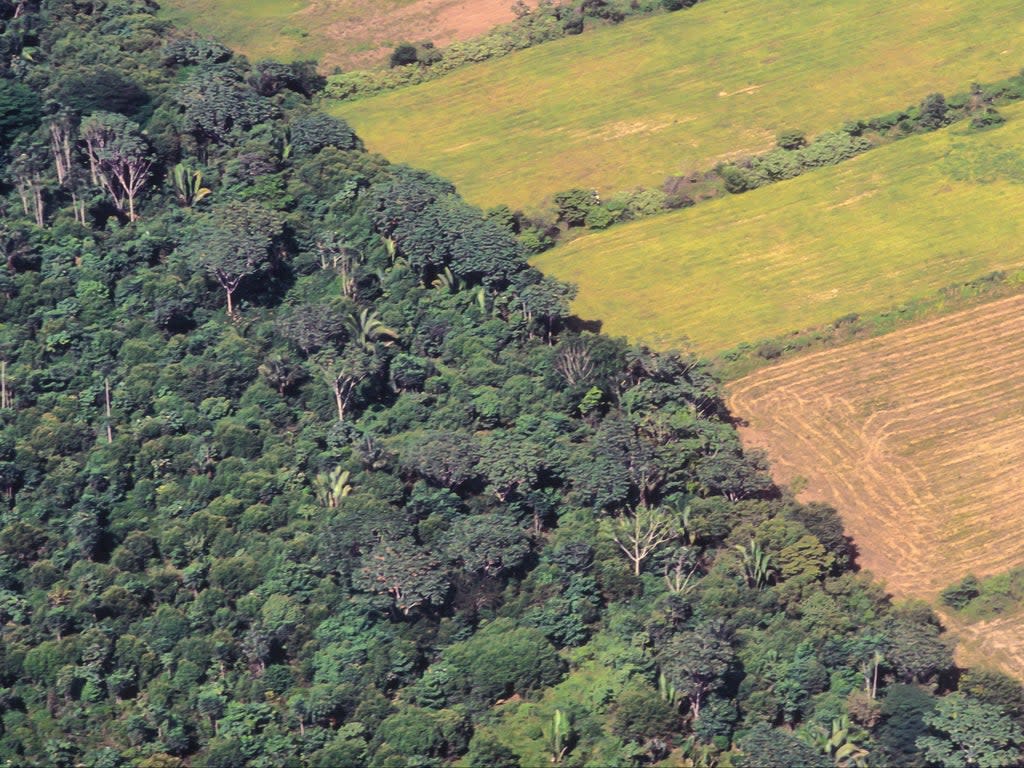Cathedral City cheese, Anchor butter and Cadbury chocolate ‘linked to Amazon deforestation’, Greenpeace claims

Well known supermarket brands such as Cathedral City Cheddar, Cadbury chocolate, Anchor butter, Country Life butter and Davidstow Cheddar, have been linked to “the destruction of vast tracts of Brazilian forest”, through use of farms which feed cattle soya sold by a controversial supplier.
A group of British farms, which sell their milk to these companies, source some of their animal feed from companies buying Brazilian soya exported by the US grain giant Cargill, the investigation by Greenpeace, ITV and the Bureau for Investigative Journalism claims.
They allegedly uncovered a complex soya supply chain linking British dairy farms to “environmental devastation” thousands of miles away in Brazil’s Amazon and Cerrado regions.
Both regions are already at huge risk from further deterioration from fire and deforestation, largely to create more agricultural land.
The Cerrado region, where most of Brazil’s soya is grown, is home to 5 per cent of the world’s plant and animal species, while the Amazon contains 10 per cent of all known species.
The investigation found soybeans from deforested land are being mixed in with certified beans and ultimately fed to dairy cattle in the UK.
The team said one of Cargill’s Brazilian suppliers, Grupo Scheffer, has been responsible for multiple incidents of environmental damage, including clearing large tracts of tropical forest.
A reporting team on the ground in Brazil’s Mato Grosso state also found recent deforestation was linked to a soy farmer who sells to Grupo Scheffer.
The team said that while they had managed to identify certain well known brands, there could be many more British dairy products linked to deforestation in Brazil.
Anna Jones from Greenpeace UK said: “Many people will be appalled to hear that their cheese and butter are linked to forest destruction on the other side of the Atlantic. And yet huge chunks of Brazilian forests and other vital ecosystems are still being cut down to grow tonnes and tonnes of soya that’s then fed to chickens, pigs and dairy cows in the UK.
“The global meat and dairy industry is fuelling the climate and nature emergency, and this needs to stop.
“With the Glasgow climate summit just days away, Boris Johnson should seize the opportunity to end deforestation in UK supply chains. He should bring in both a strong deforestation law and a meat and dairy reduction strategy in line with climate science. This would set a clear benchmark for world leaders to follow.”
In a statement Cargill said: “We take this type of grievance against a supplier very seriously… If violations are found in any area, we will take immediate action in accordance with our Soy Grievance Process. Cargill has worked relentlessly to build a more sustainable soy supply chain”.
Arla Foods who make Anchor butter, Cravendale milk, and ASDA’s Farmers milk said: “Both Arla and the dairy farmers that own our cooperative are taking steps to manage our use of soy responsibly. Since 2014, we have purchased RTRS-credits (Standard for Responsible Soy Production) to cover use of soy in feed on Arla owner farms and in ingredients that [are] not already certified.”
Saputo, which owns Davidstow Cheddar told The Independent: “From early 2022, our Davidstow Farm Standards will mandate that all farms which supply to Saputo Dairy UK’s Davidstow creamery must source feed from suppliers with a sustainable soy purchasing policy. For the two years prior to the introduction of this new policy, we have purchased RTRS soy credits, the proceeds of which are utilised by the RTRS to support producers that cultivate soy in a responsible way.
“As part of our commitment to source 100 per cent of our principal ingredients sustainably, we will continue to engage with farmers to strive to transform the industry towards more sustainable practices.”
A Mondelez spokesperson told The Independent: “Eliminating deforestation is critical to protecting the local ecosystems that farmers need to produce sustainable raw materials.
“That is why we’re working with manufacturers to promote sustainable business practices and have collectively urged the UK Government to legislate for mandatory reporting across the whole supply chain, so we can source deforestation-free commodities such as soy.
"As part of our commitment to tackling deforestation, we have made it clear that we expect all our UK diary suppliers to work with us and contractually commit to ensuring they are sourcing 100 per cent deforestation free feed by 2023.”
Every year, the British dairy industry imports an estimated 360,000 tonnes of soya from countries including Brazil, Argentina and the US as animal feed in 2019, Greenpeace said.
But even this volume is dwarfed by the poultry sector’s usage of soya, making dairy farms the UK’s second-biggest consumer of soya-based feed.
Cargill controls about 70 per cent of the UK soya market. The company ships more than 100,000 tonnes of soybeans to the UK every year from Brazil’s Cerrado region alone.
The Independent has contacted all the companies named for comment.
Read More
Cop26: Queen’s anger at ‘irritating’ world leaders who ‘talk but don’t do’
Rail workers to go on strike in Scotland during Cop26
Lytton fire investigators eye criminal probe and rule out train spark as cause
Cop26 likely to miss target, says US climate envoy John Kerry
UK will not meet net zero target unless millions of trees are planted, charity warns
Electronic waste from this year alone will weigh as much as Great Wall of China

 Yahoo News
Yahoo News 
